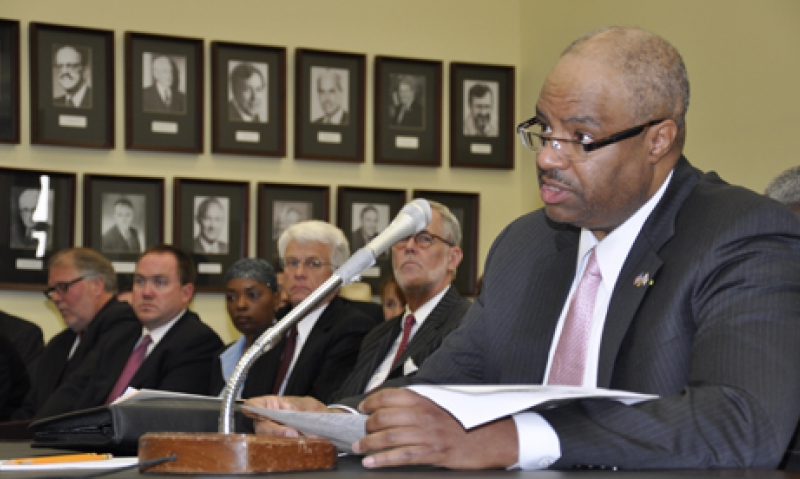
Economic director tells House subcommittee that several federal agencies aren't living up to the law.
Testifying before a House subcommittee today, The American Legion said that veterans' preference in the federal job market "is being unlawfully ignored by numerous agencies.
“The reality is that employment opportunities are not being properly publicized,” said Joe Sharpe, the Legion’s Economic Division director, in his written testimony. “Federal agencies, as well as federal government contractors and subcontractors, are required by law to notify the Office of Personnel Management of job opportunities.
Sharpe testified before the House Subcommittee on Labor, Health and Human Services, Education and Related Agencies, chaired by Rep. David Obey, D-Wis. Sharpe said that such behavior on the part of some federal agencies make the Veterans Employment and Training Service (VETS) a critically important program, since it investigates violations of veterans' preference policy and corrects unlawful practices.
"The mission of VETS is to promote the economic security of America's veterans," Sharpe said. "The American Legion is eager to see this program grow, and especially would like to see greater expansion of entrepreneurial-based, self-employment opportunity training."
The American Legion has recommended about $340 million for fiscal 2011 to fund five Department of Labor programs created to serve veterans:
• Veterans Employment and Training Service (VETS): Offers employment and training services to eligible veterans through non-competitive "Jobs for Veterans" state grant programs. • Transition/Disabled Transition Assistance Programs (TAP/DTAP): Help servicemembers who are separating from active duty with their return to the civilian world and work force. ($267 million, including VETS funding)• Homeless Veterans Reintegration Program (HVRP): A competitive state-grant program for agencies and organizations that offer jobs to homeless veterans. ($50 million)• National Veteran' Employment and Training Services Institute (NVTI): Ensures that staff for federal and state employment services are highly trained and proficient in dealing with veterans' needs. ($6 million)• Veterans Workforce Investment Program (VWIP): Provides training and support services to veterans to lead to higher wages and long-term careers - especially those with service-connected disabilities, are recently separated from active duty, or have significant barriers to employment. ($20 million)
Sharpe also recommended $61 million in funding for the Office of Personnel Management to improve compliance with veterans' preference rights in the job market. He reminded the subcommittee that employment rights of veterans and servicemembers are covered by the Veterans' Employment Opportunity Act of 1998 and the Uniformed Services Employment and Reemployment Rights Act of 1994.
The TAP and DTAP programs need to be expanded quickly, The American Legion says, to include many National Guard and reserve members whose businesses have suffered -or have been lost - while they were serving their country. While DoD estimates that 79 percent of active-duty troops attend TAP seminars, only 35 percent of reserve components do the same.
"These attendance numbers are a disservice to all transitioning servicemembers," Sharpe said. The American Legion wants DoD to make its TAP and DTAP sessions mandatory for all servicemembers leaving active duty.
Discussing the VWIP program, Sharpe noted that current funding allows it to operate in only 15 states. "The problem is clearly a lack of adequate funding. The budget baseline needs to be increased to ... train eligible veterans in all 50 states in fiscal 2011," he said.
At the start of the hearing, Obey - who chairs the House Appropriations Committee - expressed frustration over congressional reluctance to fully fund programs favored by The American Legion and other veterans service organizations.
He said he favored almost all of the programs proposed by the score of testifying witnesses, but noted the combined cost would increase President Obama's proposed FY 2011 budget by $14 billion. But in light of the massive federal deficit, Obey said, Congress is being asked to trim $3.5 billion from the president's figure.
"Congress needs to realize that there are deficits that need to be considered other than federal budget deficits," Obey said, "like deficits in jobs and opportunities and care." With that prologue, he opened the morning round of testimony.
Click here for Sharpe's testimony.
- Careers

